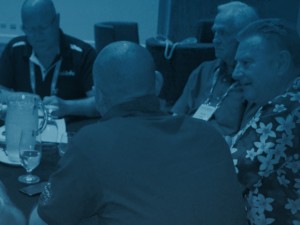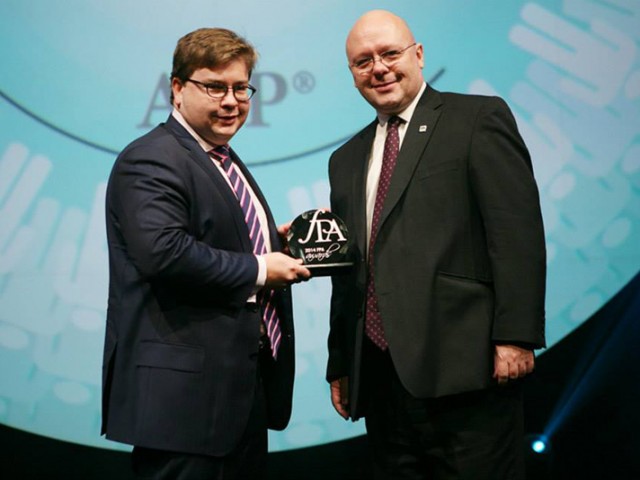‘Sticks and stones may break my bones but names will never hurt me.’ It’s a nice idea, but right now the financial advice sector is hurting from a seemingly never-ending barrage of bad press. How does the industry turn around public perception and get people focused on the good news stories? Can one person really make a difference? Award-winning adviser, Troy MacMillan, believes so…
It’s a tough time to be an adviser. Everywhere you look there are headlines about dodgy dealings and untrustworthy individuals, and the industry has been subject to five separate Parliamentary inquiries in the past 12 months, not including the Financial System Inquiry.
Most recently, the Australian Securities and Investments Commission issued a scathing report on the delivery of life insurance advice, saying the entire sector needs to improve the quality of advice and ensure that the interests of consumers are given priority.
One thing that consistently emerges in talks with advisers, however, is that the bad apples are very much in the minority. In fact, a study by The Beddoes Institute found that, when compared against a range of other sectors, advisers on the whole were delivering above average customer service.
Beddoes used a well-recognised benchmarking tool, the Net Promoter Score (NPS), to measure how advice providers compared with the service levels provided by businesses in financial services and other industries. An NPS score higher than zero is regarded as ‘good’. Advisers scored an average NPS of 27.
What’s more, advisers rated by The Beddoes Institute as ‘the best of the best’, making up the researcher’s Most Trusted Adviser Network, achieved an average NPS of 72. The Most Trusted Adviser Network was established by Beddoes in August, to serve as a referral source for consumers, and as a way to champion best of breed advisers.
“We are seeing phenomenal results from these advisers. And their clients are gaining better outcomes than we have seen from other adviser relationships,” said Director of The Beddoes Institute, Dr Adam Tucker.
“The Most Trusted Adviser Network enables consumers to find an adviser who has really happy clients. We have gone direct to the clients and they have provided us with honest and detailed feedback,” Dr Tucker said.
So, how do good advisers make themselves heard amid the noise? And can you change the perception of an entire industry?
A daily challenge
Member of the Most Trusted Adviser Network and 2011 AFA Adviser of the Year, Troy MacMillan, believes it is possible to improve the public’s view of advisers, but admits it will take some effort.
“People’s perceptions of financial advice are significantly different than the reality of what the top advice businesses are doing. If anything, that drives us forward and ignites our passion. We have to change people’s perceptions on a daily basis,” MacMillan told riskinfo.
“Prospective clients come in to see us and have this perception that you’re going to talk to them about products, percentages and sales. But that’s also the rewarding part. When people walk in our door, or pick up the phone to speak with someone from the business for the first time, everything about the service they receive is different from what they expect.”
Establishing his own advice business, The Wealth Designers, in 2009, MacMillan said his number one priority was to make sure everyone in the business was focused on delivering the best experience for the client.
“Everything is done through the eyes of the client: what is the client thinking at this point in time? At every contact point, be it on the phone, their first meeting or the presentation of their advice, it’s all got to be done with the aim of delivering the best experience for the client.”
This ‘client-first’ approach is the foundation of what MacMillan terms the ‘new world of advice’.
We have to change people’s perceptions on a daily basis
“The new world of advice is much more than just financial advice – it’s providing financial governance. It’s about understanding why clients come to see an adviser in the first place, then providing the leadership through any hard financial decisions, the expertise in areas where capability is required, accountability where financial habits need to be adjusted, whilst maintaining the total focus on their desired outcomes,” explains MacMillan.
“It comes down to being able to articulate value. In the ‘new world’, we articulate value by really understanding why our clients pay a fee every year. It’s about understanding their aspirations, their hopes and their dreams. Once we understand why they buy our service, then it’s easy to articulate exactly what we can do, and what governance is required, to deliver the most value enhancing service to each individual client.”
MacMillan says that the client’s ‘why’ is established in the first meeting with his firm, and documented in the terms of engagement presented to each client.
“We’ve captured it in that first meeting; we’ve recorded it. And then we present it back to them, in their own words. The why is not someone saying: ‘I want to set up a self-managed super fund’. The why is statements like: ‘I want to make a difference to my childrens’ lives’, or, ‘I want to be able to be there the way my Father was for me’. It’s a far deeper, richer conversation.
“When clients realise that we want to not only provide the advice, the services but also the governance to maximise the probability of them achieving their desired outcomes, the flow-on effect is huge. It establishes the trust much earlier in the relationship than often occurs in our previous client-adviser engagements.”
MacMillan continues: “Then, on the second page of our annual terms of engagement proposal, there is a clearly articulated description of what we can do, to give them the best chance of achieving their desired outcomes.
“Finally, the proposal sets out what it’s going to cost to provide the governance, advice and specific expertise. In the past, advisers have never really had to articulate value, because they were getting paid a commission, regardless of whether they were providing value or not. Now, in the post-FoFA world, there’s a much larger concentration of advisers charging a fee for what they do. And clients are now asking, ‘What am I getting for that fee?’
“So we look at ‘why’, ‘what’ and then we clearly show ‘how much’. The fee is transparent; it’s not related to product – it’s a flat, fixed fee for a twelve month engagement. That’s the other important element – the timeframe. How can we possibly quote beyond the next twelve months? We can only see so far ahead. We don’t know what the unresolved complexities will be the year after next. But because of our process and our client-focused approach, we’re very confident about pitching to our clients every twelve months, because both parties know the value and the outcomes we can achieve in that period.”
MacMillan believes that the client engagement process alone separates his advice practice from the pack, and is something advisers need to embrace if they want to silence the advice disparagers.
“How can an advisory firm possibly start talking about what it can achieve for the client before the firm truly understands why the clients are even there in the first place?
“Our client meetings are so rewarding. People are sitting there in front of us sharing their greatest desires, and what they really want to achieve in life. The engagement process is so different from the ‘old world’, where it’s all about the ‘what’. It’s an important paradigm shift from our old, ‘transactional’ approach to client engagement, to our new, ‘governance’ approach.
“Once you’ve seen this process, you come to the realisation that there’s no place for the ‘old world’ advice approach in today’s consumer-driven society. I used to do it myself – I used to have a very shallow conversation with clients around goals. They’d say they want to travel, or retire at age 60, or whatever, and all I’d do is capture those high level things. But what we do now is to delve into those things: ‘Where do you want to travel? Why do you want to go there? What is the significance of that destination? What do you want to do when you’re there?’ We’ve had incredible breakthroughs during client meetings, when a husband and wife look at each other and say: ‘I had no idea it was that important to you’.
How can an advisory firm possibly start talking about what it can achieve for the client before the firm truly understands why the clients are even there in the first place?
“That then becomes one of the reasons why the client engages us – because we can ensure that they can get to that destination, and do the things they want to do when they get there. It’s so different. We’re specific, methodical and consistent in our approach. And because of that people, are signing up within a week of meeting with us for the first time. It makes me wonder why everyone isn’t doing this.”
MacMillan is not the only one to question the wisdom of using ‘old world’ processes when delivering financial advice. The Wealth Designers was recently nominated for the Western Australian Telstra Small Business of the Year Awards, and faced a rigorous judging process which examined all aspects of the business. MacMillan describes a panel interview in which his approach to giving advice was questioned…
“We had the General Manager of CPA Australia on the panel – which could have been either really good for us, or really bad, because she may well have had some preconceived ideas about financial planners. And then we had a Professor, who was a very smart woman, but who had no idea about financial planning. As I explained what we did for clients, the CPA General Manager began leaning forward. When I finished, she said: ‘I had no idea there were advisers out there like this’. Her perception had been changed so quickly, in just the first five minutes of my presentation, by hearing our story and how we go about doing what we do.
“I mention this because the Professor, after hearing how simple the proposition of ‘why’ really is, asked: ‘But isn’t that what everyone does?’
“I responded by saying: ‘You would think so, wouldn’t you?’
“She was truly flabbergasted at how people could be giving advice without knowing why their clients wanted the advice in the first place.”
MacMillan and his team went on to win the WA Telstra Award, ahead of businesses from a wide variety of sectors. For this reason, MacMillan said the Telstra Award process had been particularly rewarding.
“It’s a really different feeling. In the past, when we’ve won an industry award, our clients and centres of influence have congratulated us, but they tend to view it as just being at the top of your game in your specific field.
If you can articulate why you do what you do, clients connect with that right away
“In contrast, with the Telstra Award being judged across all business sectors, we have noticed an increase in the level of recognition. It’s been an incredibly uplifting experience, to be honest. Not that the others weren’t, but this is different. Even the team has noticed a difference. They’ve acknowledged that this feels like a really significant achievement.”
In the months since winning the Award, MacMillan says he has spent significant time meeting with other business owners to share the secrets of his success.
“We had so many people call us and ask for more information on what we’re doing, not just in relation to advice, but in terms of our business. How have we managed to do well when others are struggling?”
He believes that by sharing this new world approach to advice and running a business that more people outside the sector will begin to see advice for the service it is, not the way it is often portrayed in the media.
“I could apply the same principles from our practice to any of the businesses that competed in the Telstra Award. At the heart, it’s understanding that people don’t buy from you because of what you do, they buy based on why you do it.
“If you can articulate why you do what you do, clients connect with that right away and see the value of your approach and the governance you are offering. A shingle outside your shop saying: ‘We do this, this, this, this and this…’ is not why clients are coming to see you. We used to think clients came to see us because of our credentials, and our specialist product knowledge. We don’t advertise that any more – you won’t see that in our window. We’ve learnt that people come and see us because of why we do what we do. And why we do what we do is to connect people to their aspirations, their hopes and their dreams. That’s why we come to work every day. That’s the focus of everyone who works here. When you have that sort of momentum, it makes business easier.”
His advice to other advisers, struggling to overcome the negative perceptions surrounding the sector, is to move away from what clearly hasn’t worked.
“If the old world approach to giving advice had worked there wouldn’t be such a negative view of it today. The majority of Australians believe that the value of advice is the same as the value of financial products. Unfortunately, that’s been pushed through by the banks and the insurers and the like.
“The majority of Australians don’t get advice. But I don’t think I’ve met a single potential client that hasn’t needed advice. If we can get the Australian public to believe the value of advice is in the advice and governance, not the product, that would be such a win for everyone in this country.”

Troy MacMillan is a previous winner of the AFA Australian Adviser of the Year and the Managing Director of The Wealth Designers, the current Business Health and Professional Planner Best Australian Advice Practice. The Wealth Designers recently also won the 2014 Telstra Business Award for Small Business in WA.
















